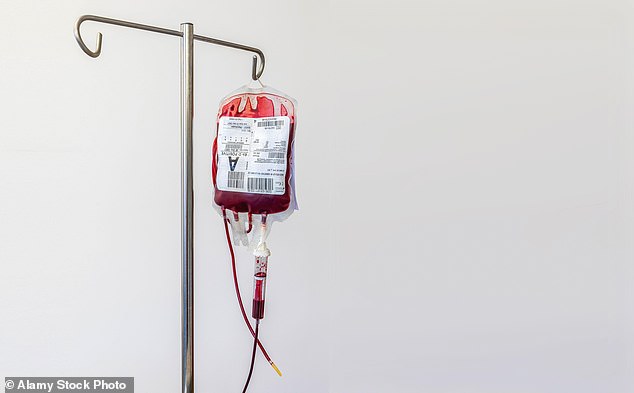Does a blood transfusion pass on the donor’s personality, too?
Organ transplants and blood transfusions are undoubtedly life-saving: last year around 4,600 people in Britain received organ transplants and almost 200,000 liters of blood were given in transfusions.
But now some scientists are starting to wonder whether something unexpected could be transmitted at the same time as the organ or transfusion.
It is memory – both in terms of cells that convey human memory itself (i.e. preferences and character traits), but also in terms of individual cells that carry memories of harmful disease traits.
There are well-publicized stories of people who have undergone organ transplants describing how suddenly they experienced personality changes and developed tastes they had never had before. In the US, a 47-year-old woman underwent a lung transplant from an 18-year-old and developed a craving for beer and fried chicken.
Some scientists also think that blood transfusions have this kind of effect.
Last month, researchers at the Karolinska Institute in Sweden published a major study suggesting that a cause of spontaneous cerebral hemorrhage can be transmitted through blood transfusion.
Organ transplants and blood transfusions are undoubtedly life-saving: last year around 4,600 people in Britain received organ transplants and almost 200,000 liters of blood were given in transfusions

But now some scientists are starting to wonder whether something unexpected could be transmitted at the same time as the organ or transfusion
The study, published in the Journal of the American Medical Association, found that patients who received blood from donors and later suffered recurrent brain hemorrhages were more than twice as likely to develop one themselves.
The researchers used a Swedish-Danish database that contains information on donors and patients who received a transfusion since the 1970s; more than a million patients were involved.
The findings suggest that some factors that can trigger spontaneous brain hemorrhages may be spread through blood transfusions. However, because only 0.1 percent of donors in the study subsequently suffered recurrent brain hemorrhages, this affected a small number of patients.
Gustaf Edgren, associate professor of epidemiology and one of the researchers, said: ‘Blood transfusions are relatively common, making negative effects a major public health issue.
‘However, it is very unlikely that you will have a brain haemorrhage from something transmitted through a transfusion.’
But why does it happen at all? The researchers now plan to examine samples from the Danish Blood Donor Study biobank to see if they can identify abnormal proteins linked to the condition that may damage blood vessels.
However, other scientists have suggested that there may be something more subtle behind this – and some go much further and suggest that the blood transfusion process can even transfer personality traits from donor to recipient.
For example, five years ago, a University of Geneva study reported how almost half of patients reported changes in their behavior and values after receiving blood transfusions.
The researchers interviewed seven people who had received blood transfusions for orthopedic surgery, such as hip replacements, and found that three of the seven believed their personalities had changed. One said he was sleeping and dreaming much more than before; and another said his sense of taste had changed, which he found worrying, saying: ‘I hope the donor’s blood can’t take over.’
The third patient reported feeling happier and stronger after the transfusion.
The authors concluded that: ‘A better understanding of the frequency and significance of these observed changes is important because physicians may need to consider such information when obtaining consent for transfusion.’
Such beliefs may simply be dismissed, but scientists studying an emerging field – so-called cellular memory – say personality transfer in the aftermath of organ transplants or blood transfusions is not just fantasy. In a 2019 article in the journal Medical Hypotheses, Dr. Mitchell Liester, an assistant clinical professor of psychiatry at Colorado University, proposes an idea that “memories of the donor’s life are stored in the cells of the donated heart and then ‘remembered’ by the recipient after a transplant.”
If this sounds bizarre, five years ago scientists reported that they had successfully transferred memories from one snail to another by transplanting their tissues. The scientists delivered mild electric shocks to the tails of a species of sea slug called Aplysia californica. These made the snails’ defensive withdrawal reflex – where they contract to protect themselves from damage – clearer.
The shocked snails had learned to avoid the stimulus. Those who received the shocks contracted defensively for 50 seconds when their tails were zapped, while those who received just one second did not contract. But after the unshocked snails received transplants from the shocked snails, they contracted for 50 seconds when zapped.
David Glanzman, a professor of biology at the University of California, Los Angeles, who co-authored the study, said the result was “as if we had transferred memory.”
Writing in the journal eNeuro, he explained that the transplanted cells contain genetic information called RNA, which is involved in various roles, including how genes are turned on or off.
Other scientists now suggest that memories may be stored as chemical codes in the proteins around which our DNA is wrapped.
But whether this means that memories are actually transferred via blood transfusions or organ transplants remains to be seen.
